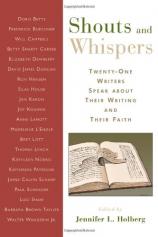Shouts and Whispers: Twenty-One Writers Speak About Their Writing and Their Faith
Review
Shouts and Whispers: Twenty-One Writers Speak About Their Writing and Their Faith
In her introduction, editor Jennifer Holberg explains what these 18 essays and 4 Q&A interviews have in common: They all "share a common beginning," presented in front of audiences at Calvin College's Festival of Faith and Writing, a biennial gathering of writers and readers and students of writing. And indeed that is about the extent of what the chapters have in common, except for the fact that the contributors have an underlying Christian faith and are established writers --- in the field of fiction, nonfiction, poetry or cinema (as in the case of Paul Schrader).
Some of the essays are very personal. Katherine Paterson (the only writer featured twice) discusses the origins of certain books, principally BRIDGE TO TERABITHIA and THE GREAT GILLY HOPKINS. Madeleine L'Engle recaps highlights of her writing journey. In a largely anecdotal essay curiously titled "Faith and Fashion Blunders: Shifting Metaphors of Mortality," Thomas Lynch hardly talks at all about the craft of writing.
A few contributors such as Bret Lott ("Why Have We Given Up the Ghost? Notes on Reclaiming Literary Fiction") are clearly addressing an audience of would-be writers. Most have a broader base. Luci Shaw's chapter, "Reversing Entropy," includes only one personal anecdote (though excerpts of several theologically based poems) that relates her response to reading the biblical account of the conversion of Saint Paul.
Theologically, there's something here for conservative Christians and liberals; the line-up is weighted heavily to Protestants, Catholic Ron Hansen (author of MARIETTA IN ECSTASY) seeming to be the one exception. My phrase "seeming to be" draws me to my one complaint of the book. These lecturers surely were introduced to their lecture-hall audiences, and the lack of corresponding "contributor" bios sometimes puts the reader at a disadvantage. I did not know the work or reputation of some of these writers, such as Silas House and David James Duncan. Before reading their essays, I wished for a paragraph that set the stage.
In this regard, a wonderful essay by Thomas Lynch starts with a long anecdote about the death and burial of his son's beloved cat. My interest in this story was heightened by my previous knowledge that Lynch's first profession was as a mortician. Lynch himself doesn't clearly say he's in the funeral business until midway through his essay. That piece of biographical information would have served a good purpose for a reader who was not yet familiar with Lynch's nonfiction writing (often on themes of death and its rituals).
SHOUTS AND WHISPERS is not a book to sit down and read all in a day, but it is a book that any serious reader will want to add to a serious library. In nearly every essay or interview --- others, not previously mentioned, being by or with Barbara Brown Taylor, Doris Betts, Frederick Buechner, Kathleen Norris, Will Campbell, Elizabeth Dewberry, Jan Karon, James Calvin Schaap, Joy Kogawa, Betty Smartt Carter and Anne Lamott --- I underlined sentences and paused to reflect about some aspect of their (or my) creative work or spiritual journey.
Don't miss the eagle story in the "Glory into Glory" essay by Walt Wangerin (most recently the author of JESUS: A NOVEL). Though the talk was presented in 2000 when Wangerin was healthy, it is eerily poignant considering his 2006 battle with metastasized cancer. "It's as if [the eagle] called your name," he writes, surely alluding to a 1970s book I now want to reread: I HEARD THE OWL CALL MY NAME.
One good book leading me to another --- that's just how reading should be.
Reviewed by Evelyn Bence on March 1, 2006




